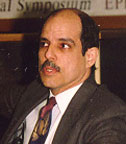Reporting in the Global Economy: Beyond Supply and Demand
<< Previous Panel | Next Panel >>
Panelists:
John Bussey
Tokyo Bureau Chief, The Wall Street Journaland The Asian Wall Street Journal
Ann Crittenden
Former Director, Fund for Investigative Journalism; Author, Killing the Sacred Cows: Bold Ideas for a New Economy
Paul Solman
Business Correspondent, MacNeil/Lehrer NewsHour
James Steele
Pulitzer Prize-winning Correspondent, The Philadelphia Inquirer; Co-Author, America: What Went Wrong?
Andrew Tolan
Nieman Fellow; Executive Producer, National Public Radio documentary series Vanishing Homelands; Recipient, Robert F. Kennedy Journalism Award
David Usborne
Washington Correspondent, The Independent, London; former bureau chief, Brussels
Interlocutor:
Bill Kovach
Curator, Nieman Foundation, Harvard University
David Warsh
Economics Columnist, The Boston Globe
Alan Webber
Publisher and Executive Editor, Fast Company; former Editorial Director, Harvard Business Review
Moderator:
Sarah Cruikshank
EPIIC Colloquium
"If a journalist's purpose is to help the citizenry make sense of the world around us, what better way to do it than decode the experts, untangle the statistics, and get back to the basics of understanding."
--Paul Solman, "MacNeil/Lehrer NewsHour"
| ||
| ||
|
The global economy is a complex subject, incorporating a wide variety of issues and disciplines--from bank failures to famine; from technology diffusion to international monetary policy; from mathematics to philosophy. As such, it poses a dynamic and difficult "beat" for journalists. Because the global economy cannot be neatly pigeon-holed, it needs an overarching framework to understand solitary events and their impact. Joseph Bower, of the Harvard Business School, suggests that a serial coverage of economic events could serve as an on-going "tutorial" for the public providing context.
Virtually no aspect of economic life is exempt from foreign ties, yet in many newsrooms, there is still an attitude that economic news is narrow and applicable only to a limited audience. Since the world has become a video culture, television replacing print media as the main source of news, it is difficult to translate the economic stories to visual terms. Adding to this difficulty of covering the international economy is the attitude of many local editors that the farther away an event is from the particular media's audience, the least it is considered news. John Maxwell Hamilton of the World Bank argues that this opinion couldn't be further from reality. He says that "no city no matter where is exempt from economic interdependence." A bank failure in one city or country can have far reaching implications, witness the Bank of Credit and Commerce International.
Journalist can make these global connections by asking the right questions, which Solman argues, do not have to be complex. He contends that it is a question of wondering "what people need to know." Continuing with the BCCI example, it is the media's responsibility to provide more information than simply that certain bankers are crooks--what kind of policies are in place that draw crooks to banking and allow the crimes to take place? How inclusive are international banking regulations? What is the domestic link?
In the international context, the U.S. press and public is often more at a disadvantage than their counterparts in Europe in Japan, although all countries are generally more interested in the ups and downs of the domestic economy than the global economy. What is the media's role in stretching this more limited understanding? Why should the public in the U.S. be concerned about development issues in Africa? Why should the people in the European Community care about the U.S. trade deficit? Will the interconnectedness of local and global economics force editors out of their isolated shelters?
Another issue that journalists must address is whether or not there is room for interpretation and implications of economic news. David Warsh, economic columnist for The Boston Globe, argues that historical and skeptical analysis should be incorporated into economic coverage, while Kazutami Yamakazi, of the Nihon Kiezai Shimbun, says that "factuality" is the key element of economic-financial coverage and that only facts should be presented--trade balances, unemployment rates, stock prices. Dieter Buhl, senior political editor of Die Ziet in Germany, praises the American press for "respecting the rules of capitalism," translated as the "writer will basically accept the functions of the market and doesn't have an ideological prejudice against someone who makes money the capitalist way." On the European continent, he finds that writers are more likely to infect a story with their own ideology.
Having a story conveyed through a reporter's distorting political lens becomes a concern when the media's influence on public opinon and on policy decisions is considered. In the wake of growing trade deficit, U.S. journalists began an almost daily report of the U.S. trade imbalance with Japan, which many believe affected relations between the two countries as well as policy choices. Many analysts contend that it increased tensions and made negotiations more difficult. And recently a commentator on American Public Radio's "Marketplace" said that these days, the Wall Street index is affected more by the media than by policies and corporate activity. How can the political rhetoric be balanced with real statistics to allow the public to form their own opinions?
Another aspect of reporting the global economy is the media itself. The media is a business--NBC is owned by General Electric, The Wall Street Journal is sponsored by Dow Jones Industrial. Does the corporate aspect of the media impinge upon the information made available? Does it affect the stories covered?





